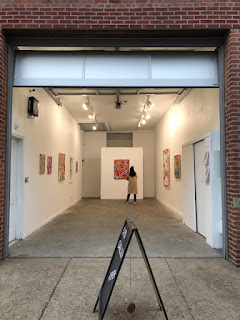For a very brief time in my youth, I worked in sales. As with jobs of that kind, numbers were everything: I, and other salespeople, were rated on the number of sales and the dollar value of them.
Knowing that, I, of course, went for the easiest "closes." (A "close" is a completed sale.) After I drained the pool of easy marks, I realized that I hated sales and quit soon after.
There are other lines of work in which people are similarly evaluated. Management calls those numbers "metrics" and use them, not only to decide on promotions, but also whether to continue someone's employment. Such a situation, I discovered, also prevails in the academic world: Decisions on tenure, promotions and continued employment are based on, among other things (like the ever-so-concrete category called "collegiality") the number of a faculty member's publications, and how much grant money he or she brings to the institution.
If anyone asks you what a professor and a police officer have in common, now you know. In many departments--including the one in the "City of Angels"--police are judged by, among other things, the number of tickets they write and arrests they make. Here I have no truck with conspiracy theories: Constables themselves have said as much. They also admit that they go after cyclists because we're the proverbial low-hanging fruit. I am learning that I am not the only cyclist who's been stopped by cops--and ticketed--for something I didn't do.
One way you can tell a true salesperson, without knowing his or her numbers, is that such a person is a "schmoozer" (which I can be, when I feel like it) and gets a rush out of engaging, and closing the deal with, a customer. It always seemed to me that to a true salesperson, the deal or the sale is, to them, as the painting or sculpture is to an artist.
Many police officers, I suspect, get a similar thrill out of a "collar." "Everybody loves a good bust," said J.P. Harris, a retired Los Angeles County sheriff's lieutenant who now sits on the Sheriff's Civilian Oversight Board. "The person who makes the right hooks, they are respected, they are admired."
A source for the Sheriff--who asked to remain anonymous because he's not authorized to speak in public--confirmed the suspicions I, and probably many of you have about why we're targeted: "Like a lion looking for prey, what is she going to do?" The source explained, "That's what cops do--they look for the easiest stop."
That also partially explains why non-white cyclists are disproportionately ticketed and arrested while riding their bicycles. Another officer explained that when cyclists are stopped, it's not really about the missing reflector or bell, although that's might be the reason the officer gives when he or she approaches a cyclist. Also, that officer explained, the goal isn't always to write a ticket, though that is often the result.
Rather, stopping a cyclist--especially in a low-income neighborhood, and especially if the cyclist is not white--is really seen as a gateway to making an arrest for something more serious, like gun or drug possession. Another officer explained that when was a new assistant in Compton, his training officer told him that in low-income areas like Compton, he should assume that any adult on a bicycle had most likely lost his (they're usually male) license because of some crime he'd committed.
In other words, that law enforcement agent was trained to see any cyclist in a low-income neighborhood as a criminal. And he says he wasn't the only one inculcated with that notion.
That sort of training continued for years, even though it didn't produce the expected results. According to a Los Angeles Times investigation, 44,000 cyclists were arrested in the county from 2017 until July of this year. Of them, 85 percent were searched. Only 8 percent of those searches revealed illegal items, and weapons were seized only 164 times, or in only 0.5 percent of all searches.
Perhaps the most galling aspect of those stops, arrests and seizures--and the training and mentality that produces them--is that they target the very cyclists who are least able to defend themselves against the charges. It's hard not to think that makes poor black and brown cyclists such appealing targets for sheriff's assistants with itchy ticket-writing fingers: Cops don't look good to their peers or superiors when their summonses are dismissed or charges dismissed. (That, by the way, is also the reason why the so-called War On Drugs so decimated black and brown communities: Cops won't arrest a pot-smoking prep school kid whose parents can afford a good lawyer.) In rare cases, large numbers of frivolous citations and arrests lead to disciplinary measures against and, even more uncommonly, dismissal of officers.
So, I don't think it's an exaggeration to say that the way cyclists are policed isn't just a first-world, white people's issue: It's a matter of social and economic justice.





































